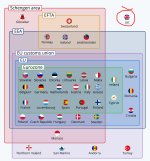It's a good question and between about Sep 2016 to Dec 2019 I was so well informed on these EU/Brexit matters I was even getting Professors of EU Law, current/former EU officials and Trade Experts who were giving advice to Parliamentary Committees piling in to back me up on Twitter with evidence and legislation they could immediately cite, if I was one of the first to take various prominent Brexit figures to task on some nonsense or other they were now spouting. It's funny how you lose knowledge when you're not actively employing it anymore, which has happened to me once Boris won the 2019 election and the fight to stop Brexit, or at least leaving the Single Market, was effectively over. I don't have the detailed knowledge specific to the music industry, nor the I think very limited measures that have belatedly been brought in to help a little.
I'll give it a general go though, see if some things start to come back to me as I talk this through (for myself as much as anyone else).
What a Customs Union primarily does is create a common
external tariff barrier for
goods. Inside a Customs Union, goods can travel across it's members borders without having to stop and pay tariffs [ useful reminder; tariffs are a levy usually designed to protect a domestic industry from foreign ones undermining it ]. It does not mean that there is no documentation required. Advance declarations, transport documents, invoices are all still required. It does not mean it is friction-less in another very important way. A Customs Union is only about tariffs, it does not address
standards. That was taken care of by the Single Market. So goods imported from a third country are stopped at the port of entry of the Member State of a Customs Union, where appropriate agreed tariffs are levied and paid by the importer. Thereafter these goods are allowed to circulate freely
within that member state, however they may not be able to circulate freely across the border to any
other member state of a Customs Union because each member state
might have
different standards on products. The EU created their Internal Single Market so that all standards, once agreed between the member states and various interest groups within the EU eg Trade unions, consumer rights groups, health and safety bodies, environmentalists, businesses etc. were uniform. So standards are also checked at the external border
when it comes to the EU. Thereafter, other than the usual random spot checks and security checks, it was free friction-less movement of goods across the EU 28.
It is worth appreciating just why this is. The EU tries to present a level playing field within it. Within the Single Market therefore, the various EU members and interest groups have agreed some minimum standards and rights for workers, for consumers, for the environment and for health and safety. Meeting those standards has costs for business. Not meeting them means savings which in turn would mean, all things being equal, businesses outside that level playing field Single Market can undercut those within it. The EU is said to be protectionist. Well they are not
internally, but externally they are because they will not allow their own businesses of their own members to be
unfairly undercut. So, there are external tariffs, though they are generally much lower than the rest of the world and they make exceptions, such as zero tariffs for everything (but arms) that are supplied by the worlds 49 poorest countries, or South African oranges outside the main Spanish orange growing season. In total the EU had 70 Free Trade Agreements around the world when we voted for Brexit. Even some of the tariffs were on the Entry Price System threshold, which were hardly ever triggered as prices didn't drop that far.
The Customs Union solves tariffs on goods. There are no tariffs on
services, so a Customs Union on it's own is irrelevant for services. It does not solve
standards on goods either. So an electrical product from China, imported to the UK might not meet EU standards. This is important because we have been making considerable noises since we left, in fact it was a big part of the rhetoric of the leave campaign, that we would take back control, not be subject to Brussels rules and we would diverge from the supposedly onerous EU standards and red tape. We then signed deals with Australia and have signed Memorandum of Understandings (technically worthless but never the less indicators of intent) with a US State. We've told the EU we don't want to stick to your standards. So the EU are forced, by their own huge, detailed, carefully constructed rule book, which has implications on all their other international agreements too, to impose those standards and checks on us, a now third country. This is particularly true for sanitary and phytosanitary checks, because of the public health risks, less so for the products the music industry will have with them, although if I remember correctly there are particularly high standards on electrical goods too. Never the less, it's all paperwork, all queues.
So, let's have a think. When a band goes on tour, what does it have with it? It is going for work purposes, so
each member state has its own visa requirements for third country visitors. It is bringing quite a lot of equipment. What will the border officials have to consider? Is the band selling it or using it? Is it of a standard that is compatible with EU regulations? Is it pretending to be a band, but really just trying to smuggle in some premium goods that it can avoid tariffs on by selling on the sly? Let's count them in and count them out, shall we? What are all these t-shirts, badges, tea towels, CD's and vinyl products? What, you need to sell them as merchandise to help fund the band and the tour and also because the fans demand them in the moment? So you are selling goods, not just services? Is there VAT to account for on them? Tariffs? These things are largely made in China, do they conform?
There are some points I've missed that are worth thinking about. I can't be bothered inserting them back in the appropriate paragraphs so I'll just list them here.
There are, or were in 2016, 16 customs unions notified at the WTO. The EU one is I think the only one to cover ALL goods. MERCOSUR, the South American one doesn't cover things like Sugar and Vehicles for instance.
The Turkey EU one doesn't cover agricultural goods, or coal and steel. So you can have partial customs unions.
Instead of a Customs Union, Free Trade Agreements are doable, which can remove tariffs and other restrictions on goods.
The problem with an FTA is companies then have to comply with the very complex ROO (Rules Of Origin) to show the products components were 50%+ from countries who are party to the FTA.
The problem with a Customs Union is it automatically limits the sovereignty of a country on doing its own Trade Agreements, as it is has no leeway to negotiate on tariffs. If the EU negotiates new tariffs, Turkey has to go along with that and perhaps renegotiate its other agreements, or choose to leave the EU one.
Turkey's other problem is it's agreement doesn't cover transport services, hence the Turkey-Bulgaria border routinely suffers 10 mile tailbacks.
You can't have your cake and eat it.
Barriers to trade increase costs of trade.
We trade most with countries nearest us. That is true all over the world and throughout history. The gravity model of trade is the one thing economists can hang their hat on as much as biologists can hang their hat on Darwin's Theory of Evolution.
The EU tries to ensure suppliers in developing countries factories meet EU safety standards and pay decent wages. They do inspections, but this is limited by resource. Never the less it is a noble aspiration that does usually raise standards in a factory and these places become much sought after places of work with highly motivated workers and productivity usually.
The EU does sometimes use underhand tactics and its clout, by insisting on regulation and standards that are effectively too high a barrier to trade for some third country suppliers to meet. It is protectionist. Is that an argument to leave it on a point of principle, or an argument not to leave (and put your self at the wrong end of that), while working to change it from the inside?
It's complex isn't it? And there isn't a sector of the economy that isn't affected.
It is important to understand that it is the combination of the EU Customs Union
AND the EU Single Market together that allows friction-less movement of goods (and Services and Labour) within the EU. The further you move away from this, the more costs, barriers, friction, paperwork, delays, complexity there is.
Lastly, the EU is flexible - remember the Barnier steps? - so I've shown below the various options the EU has been happy to partner with, but honestly, we should be right at the very heart of it.
View attachment 42372




